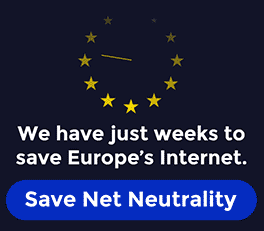 For several years politicians have debated on how Europe should approach net neutrality.
For several years politicians have debated on how Europe should approach net neutrality.
Late last year the results of these negotiations were included in the Telecoms Single Market (TSM) regulation.
While the rules offer improvements for some individual members states, various activist groups and experts warn that they don’t offer real network neutrality.
The current language would allow ISPs to throttle BitTorrent traffic permanently if that would optimize overall “transmission quality.” This is not a far-fetched argument, since torrent traffic can be quite demanding on a network.
To address this issue a coalition of activist groups have launched a campaign, hoping to change the current plans. They urge Europeans to have their voice heard in a public consultation that was launched by Europe’s regulatory body BEREC.
“We need to deliver thousands of comments to regulators, explaining to them why they should pass strong net neutrality guidelines that ban ISPs from doing class-based throttling, or zero-rating,” Holmes Wilson of Fight for the Future (FFTF) says.
FFTF is one of the driving forces behind the Save Net Neutrality campaign. According to Wilson, BitTorrent users should be particularly concerned as the current rules do next to nothing to prevent throttling.
“Europe’s new net-neutrality rules should ban throttling BitTorrent, but they don’t. They leave ISPs a loophole,” Wilson tells TorrentFreak.
“ISPs can say they’re doing it for ‘traffic management’ purposes—even when their networks aren’t clogged, because the rules say they can throttle to ‘prevent impending network congestion’,” he adds.
In addition to file-sharing traffic, the proposed rules also allow Internet providers to interfere with encrypted traffic including VPN connections. Since encrypted traffic can’t be classified through deep packet inspection, ISPs may choose to de-prioritize it altogether.
In theory, ISPs may choose to throttle any type of traffic they want, as long as they frame it as a network congestion risk.
“So if your ISP is lazy, or wants to cut corners and save money, they can throttle BitTorrent, or VPNs, or Bitcoin, or Tor, or any class of traffic they can identify,” Wilson says.
The “EU Slowdown” campaign that was launched today encourages the public to have their say on the matter, hoping to improve the current rules. Thus far 7,000 sites are participating already, with many displaying a “Slow Loading” icon.
Wilson hopes that more sites will join in. Torrent sites in particular may want to urge their users to participate.
“We think the torrent community has a lot at stake here, so we hope that torrent sites and the makers of torrent clients can join in, starting today, or through the July 18th deadline for comments,” Wilson says.





